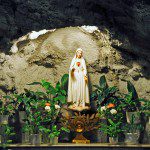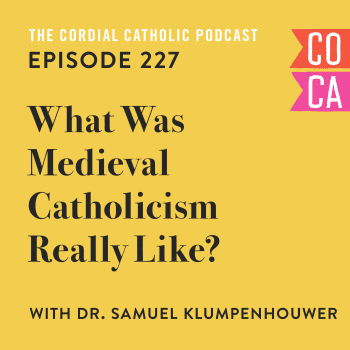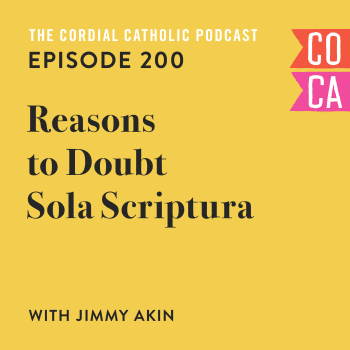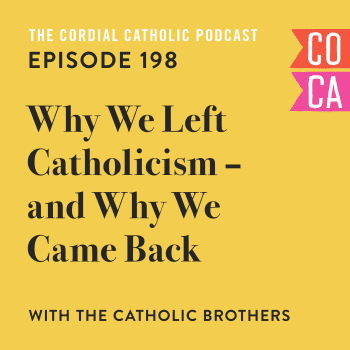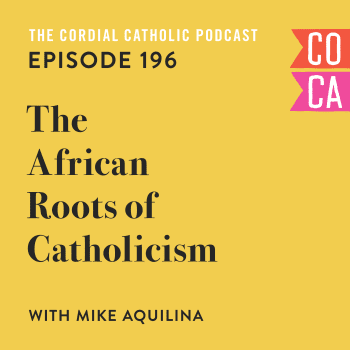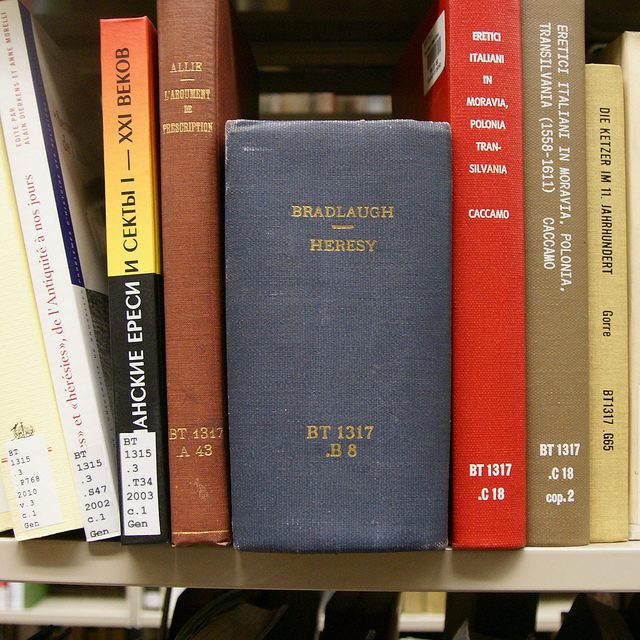
I’ve written before about digging deep into Church history and the sort of dangerous pursuit that it can turn out to be. Indeed, lots of those diggers before me have dug around and wound up, like myself, on the rapid road to Rome. This in and of itself is fascinating.
One observation I’ve made, while digging into the history of Christianity, is the confounding reality of just how amnesiac we are about the history of our own faith. I say “we” and I know that’s always dangerous so let me qualify myself before I misspeak. By “we” I mean the evangelical Protestants that I run with—that I’ve ran with—the people that I know and read, and those that have been foundational in my Christian faith life for the last fifteen years. These are mainstream evangelical writers and speakers. These are, on the very local level, Baptist and Pentecostal communities. I think, especially, of the Pentecostal Church I “grew up” in the faith in while still a high school student.
In terms of our understanding of our own history, in my own experience, we are putting up a pretty weak showing. What’s truly confounding, however, are the ramifications of our shared amnesia and that is, remarkably, the repeating of centuries old heresies, over and over again, in the modern age.
The Catholic Church: Protector of Christianity
I think, in large part, this is a much larger societal problem. We, as creatures of sin and habit, are doomed to repeat or own mistakes, ad nauseum. We forget, for example, that when so-and-so political party came into power we were promised they wouldn’t do this-or-that, and they did it anyway. We forget, for example, that we have our freedoms and liberties because thousands of men and women fought against tyranny and hatred to protect them sixty years ago. We forget, again, that Christianity was, in sum and total, the Catholic Church for 1,500 years and that it followed, in the footsteps of the apostles, to protect the faith from teaching error.
The faith we hold, Catholic and Protestant, was protected, disseminated, and fulfilled in what we call, today, the Catholic Church. While Protestantism broke away from the hierarchical structure of the Catholic Church in the sixteenth century, the Catholic Church itself has remained, and retained, what it’s always seen as an unbroken line of succession from the earliest apostles, appointed by Jesus Christ.
We—and remember I’m speaking from my own experience—forget this.
As the Church grew and taught (and even amongst the earliest apostles in the New Testament) there were plenty of errors and misunderstandings creeping into to the various faith communities spread out across the Middle East, Europe, and Asia. What’s incredible, in our shared ignorance, is how many of these heresies are repeated, over and over again, in modern Christianity. How these heresies, which were soundly dealt with and put to bed by the Church in its authority centuries ago, continue to have new life breathed into them by own our widespread amnesia.
Nestorianism and Mary, the Mother of God
I recently wrote an article about Mary as Mother of God. In it I explained that the concept of Mary being the “Mother of God” was decided upon at the 4th century Council of Ephesus in response to the break-away teachings of Nestorius the Patriarch of Constantinople. It was promoted before then, resoundingly, by the Early Church Fathers. It was even, remarkably, held in belief by the early Protestant Reformers.
But the 4th century heresy of Nestorianism is, indeed, alive and well today. As I remarked in my article, if you asked the average Protestant in the Pentecostal church I attended during high school, a pretty good slice of average, North American evangelical Protestantism, if they believed in Mary as the Mother of God they would’ve scoffed at you. Without even knowing it, these well-meaning and faithful Christians are reliving this 4th century heresy.
Mary, Ever-Virgin
To remain, briefly, on the subject of Mary the Catholic Church (along with the Eastern Orthodox and some within Anglicanism) teach that Mary was perpetually a virgin. That is, she never had intercourse. The Greek word commonly understood to mean that Jesus had siblings could, likewise, be translated to say “cousins.”
And while the perpetual virginity of Mary might sound like some kind of theological gymnastic routine it was widely held, universally, by the Early Church Fathers and, to the surprise of my Protestant sensibilities, by all the Early Reformers as well.
Come again?
No, dear reader, you didn’t hear me wrong.
Despite the reality that the same aforementioned well-meaning Christians might scoff at the idea of Mary being ever-virgin this was a widespread belief both before and after the Protestant Reformation. Universally, the early Reformers, Luther, Zwingli, and Calvin wrote strongly of Mary’s remaining a virgin after the birth of Christ. As did the Early Church Fathers from Origen to Jerome to the much-beloved Augustine.
Yet, without even knowing it, modern day evangelical Protestantism subscribes to a heretical theology that wasn’t even accepted by the founders of the Protestant movement.
Our lack of historical memory leads us, likewise, into all sorts of other heresies—beliefs and situations soundly rejected, and roundly dealt with, more than a thousand years ago.
Then There’s Donatism…
The Donatists, in the mid-300’s, became heretics for insisting that, in essence, God couldn’t be at work in a community where sinful leaders lived or taught or where any serious sinners worshipped. To summarize an important part of Church history with the delicacy of a butcher’s knife, God wasn’t the god of the sinful and He didn’t work through those sorts of folks. While this heresy was wholly condemned by the Church, and Augustine himself wrote fiercely against it, it lives and breathes today in, among other areas, those that point fingers at the Catholic Church’s disappointing abuse scandal.
How can God work in that Church with those sinners. The abuse scandal was, and is, one of the most vehemently offensive things imaginable. But to say that God can’t work in a church full of sinners is to subscribe to Donatism, a 4th century heresy.
On a more mild level, to expect a Christian Church full of only the most pure and angelic parishioners isn’t only a pipedream, it’s akin to modern day Donatism.
…and Pelagianism
Likewise, the 5th century heresy of Pelagianism is, unfortunately, alive and well and has even been condemned, recently, by Pope Francis—some 1,500 years after it first sprung up as a heretical movement. Pelagianism which says, at its core, that man can be good enough on our own, is perhaps one of the most widespread of the ancient heresies. That message—chief amongst the zeitgeist of our wider culture—is also prevalent within Christianity. Before I ever attended a Catholic Mass and heard what’s called the penitential rite I, as a good, Bible-believing Protestant, hadn’t really thought of myself as in need of penance. Not on a serious level, at least.
Pelagianism denies the real need of the grace of God and says, as such, that we can do it on our own. How many of us, even if we don’t think that way, act accordingly?
Rediscovering our History
In the end it’s rather incredible, I think, to take a longview on the history of Christianity and to discover, rather dishearteningly, how frequent and fraught we are to repeat our own errors. It’s incredible to find that, once you start digging, so many of the old problems and difficulties of our history as Christians crop up perennially. Incredible, too, that even beliefs and doctrine held fast by the Reformers are jettisoned and misunderstood by the very denominations they began.
I dug, and I continue to dig, into the history of the Christian faith. For me, it’s led to a deeper appreciation of the claims and historicity of the Catholic Church. For me it’s been a fork in the road and a divergence. Regardless, however, of where it might lead, our collective amnesia, our forgetting of who we are and where we came from, dooms us to repeat ancient heresies, over and over again. We all, one way or another, need to get out our shovels and do that hard work. I think, for if nothing else, than to relearn what we used to know, to rediscover what the Church has taught, and to realize the nature of the tradition in which we, as all Christians, stand.


